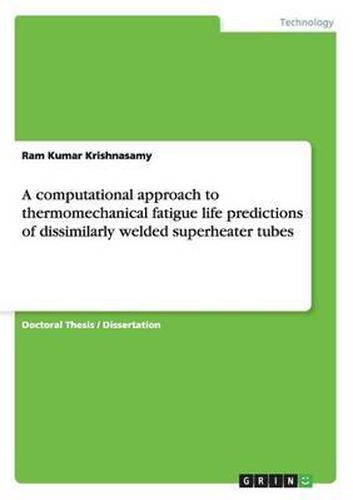Readings Newsletter
Become a Readings Member to make your shopping experience even easier.
Sign in or sign up for free!
You’re not far away from qualifying for FREE standard shipping within Australia
You’ve qualified for FREE standard shipping within Australia
The cart is loading…






Doctoral Thesis / Dissertation from the year 2012 in the subject Engineering - Mechanical Engineering, grade: cum laude (gut), Karlsruhe Institute of Technology (KIT), course: Mechanical Engineering, language: English, abstract: The primary focus of this work is to investigate the influence of residual stresses on thermomechanical fatigue (TMF) life predictions. Both experimental and numerical methods have been adapted in order to predict the lifetimes of dissimilarly welded superheater tubing in power plants. The fatigue behavior and lifetime predictions of such components are complicated at high temperatures since a complex interaction between thermally activated, time-dependent processes are involved. At the same time, components that operate at elevated temperatures are often subjected to transient temperatures due to start-up and shut-down where thermally induced cyclic stresses can occur. The superposition of thermal transients with mechanical load cycles along with unequal heating of parts of a component result in a complex evolution of damage, leading to TMF failure of the component. To add to the complexity, the degradation mechanisms relevant to welded power plant components can be accelerated by the presence of residual stresses.
$9.00 standard shipping within Australia
FREE standard shipping within Australia for orders over $100.00
Express & International shipping calculated at checkout
Doctoral Thesis / Dissertation from the year 2012 in the subject Engineering - Mechanical Engineering, grade: cum laude (gut), Karlsruhe Institute of Technology (KIT), course: Mechanical Engineering, language: English, abstract: The primary focus of this work is to investigate the influence of residual stresses on thermomechanical fatigue (TMF) life predictions. Both experimental and numerical methods have been adapted in order to predict the lifetimes of dissimilarly welded superheater tubing in power plants. The fatigue behavior and lifetime predictions of such components are complicated at high temperatures since a complex interaction between thermally activated, time-dependent processes are involved. At the same time, components that operate at elevated temperatures are often subjected to transient temperatures due to start-up and shut-down where thermally induced cyclic stresses can occur. The superposition of thermal transients with mechanical load cycles along with unequal heating of parts of a component result in a complex evolution of damage, leading to TMF failure of the component. To add to the complexity, the degradation mechanisms relevant to welded power plant components can be accelerated by the presence of residual stresses.